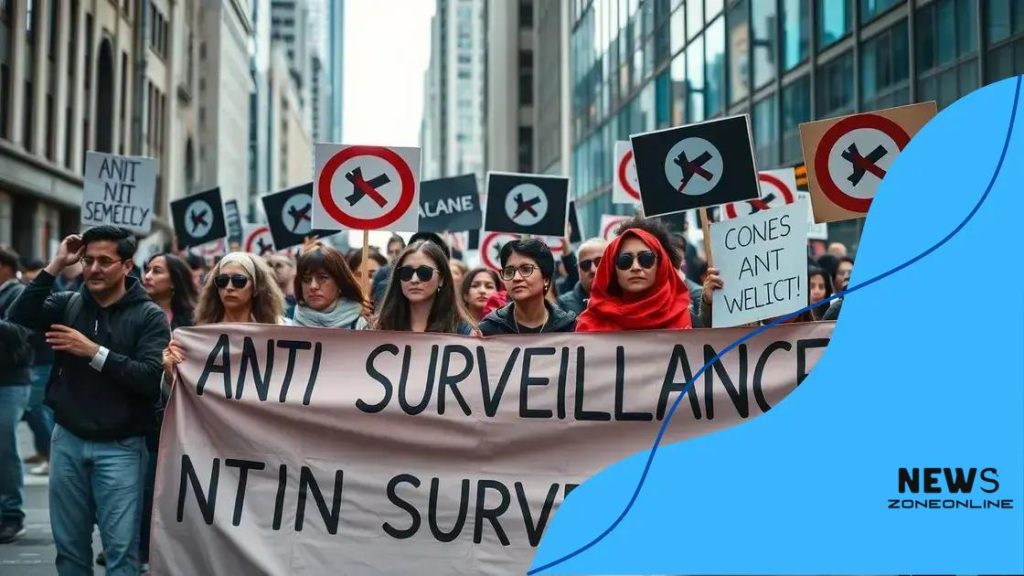Anti-surveillance protests in tech spaces gain momentum

Anti-surveillance protests in tech spaces are driven by a collective demand for privacy rights and accountability, influencing policies and shaping the future of digital rights in an increasingly connected world.
Anti-surveillance protests in tech spaces are becoming a significant force in discussing privacy and digital rights. As more individuals stand against invasive technologies, the question arises: what does this mean for our future?
The rise of anti-surveillance sentiments in tech communities
The rise of anti-surveillance sentiments in tech communities reflects a growing awareness of privacy rights and concerns over digital monitoring. As technology advances, many individuals are becoming more vocal about the importance of protecting their personal information.
Historical Context
Understanding this movement requires looking back at significant events that have sparked these sentiments. A few key instances have brought the issue of surveillance to the forefront:
- The Snowden revelations drew attention to mass surveillance practices by governments.
- Major data breaches have shown how vulnerable personal information can be.
- High-profile incidents of misuse of surveillance technologies have raised alarms among tech professionals.
With such events as a backdrop, tech communities began to mobilize against these practices. Activists emphasize the importance of digital privacy and advocate for ethical technology use. They believe that individuals should have control over their data and how it is used.
Rise of Activist Groups
The growth of activist groups has played a crucial role in promoting anti-surveillance initiatives. Many of these organizations work to educate the public and influence policy. They host workshops, webinars, and engage in public demonstrations to raise awareness. By bringing attention to these issues, they foster a culture that values privacy.
Moreover, social media platforms have become vital tools for spreading information and organizing grassroots movements. This digital outreach enables collaborative efforts to protect civil liberties in the face of increasing surveillance.
As the landscape of technology evolves, the calls for transparency and accountability become louder. Industry professionals are urged to consider the ethical implications of their innovations. Will tech companies prioritize user privacy over profit? The answer to this question may shape the future of digital rights.
Key events and movements driving protests
Key events and movements have significantly driven the anti-surveillance protests in recent years. These pivotal moments not only sparked public outrage but also galvanized communities to advocate for greater privacy rights.
Notable Incidents
Several high-profile incidents have been influential in shaping the narrative around surveillance:
- The Edward Snowden leaks in 2013 exposed the extent of government surveillance.
- The Cambridge Analytica scandal highlighted misuse of personal data by tech firms.
- Protests like those in San Francisco against facial recognition technology have united various activists.
These incidents have brought widespread concern about how technology impacts personal liberties. As news spreads, tech communities mobilize to express their dissatisfaction with current practices. With increasing awareness, more activists are joining the fight for digital privacy.
Grassroots Movements
Grassroots movements play an essential role in driving these protests. Organizations such as the Electronic Frontier Foundation (EFF) and Fight for the Future have emerged as leaders in the fight against surveillance. Their campaigns focus on:
- Advocating for stronger data protection laws.
- Raising awareness about the implications of surveillance technologies.
- Providing resources and tools for individuals to protect their data.
These groups utilize social media to spread their messages and mobilize supporters. They also organize events to inform the public about their rights. The aim is to empower individuals to make informed decisions regarding their privacy.
As movements grow, the demand for accountability and change in surveillance policies intensifies. Recent protests serve as reminders of the importance of standing up for civil liberties in an increasingly digital world.
Impact of protests on tech policies and industry standards

The impact of protests on tech policies and industry standards is significant and often leads to real change. As activists speak out against surveillance practices, their voices influence lawmakers and tech companies.
Shaping Regulations
Protests push for stronger regulations regarding data privacy and user consent. In response to public outcry, many governments are revisiting existing laws. Here are some key areas affected:
- **Stronger data protection laws**: New frameworks like the General Data Protection Regulation (GDPR) have emerged as a response to demands for better data handling.
- **Accountability measures**: Companies are now pressured to be more transparent about how user data is collected and used.
- **User rights**: Advocates are pushing for laws that empower individuals with greater control over their personal information.
Such changes reflect the growing recognition of the need for privacy in our digital lives. Tech companies are increasingly aware that public sentiment can drive their practices.
Influencing Industry Standards
Beyond regulations, protests also influence the standards set by the tech industry. As industry leaders face the consequences of public scrutiny, many are reevaluating their technology designs. This can lead to:
- **Ethical software development**: Companies are crafting protocols that prioritize user privacy.
- **Improved security features**: More products are being designed with robust security measures to protect user information.
- **Commitment to user feedback**: Tech firms are listening to consumer concerns and modifying their offerings accordingly.
As a result, there is a noticeable shift towards prioritizing ethical considerations in technology. Organizations are beginning to realize that respecting user privacy can enhance their reputation and strengthen customer loyalty.
Overall, the continued efforts of activists are deeply shaping the ways technology evolves. By standing up for privacy rights, they’re not only impacting policies but also inspiring industry-wide changes that could safeguard our digital future.
Voices from the front lines: Activists share their stories
Voices from the front lines of the anti-surveillance movement reveal the personal experiences and motivations of activists. These stories showcase the passion and determination of individuals fighting for privacy rights in a digital age.
Real Stories, Real Impact
Activists often share their journeys and the reasons behind their commitment to the cause. For many, it stems from witnessing the negative effects of surveillance. Here are a few common themes that emerge from their narratives:
- **Personal experiences with data breaches**: Many activists have faced cases where their data was misused or exposed.
- **Concerns for future generations**: A number of activists emphasize the need to protect the privacy of children and future users of technology.
- **Involvement in community actions**: Many recount their inspiration to join protests after participating in community discussions about surveillance practices.
These personal stories help to humanize the movement. They resonate with a broader audience, inviting others to engage with the important issues at stake. Seeing real people standing up against invasive technologies makes the cause even more relatable.
Community Building
Each story not only highlights individual struggles but also demonstrates the collective strength of the movement. Activists frequently note how community support fuels their efforts. Many organizations have formed around shared experiences, creating a sense of belonging and mutual support.
Through workshops, meetups, and online forums, activists share strategies for effective advocacy. This community building is crucial as it empowers individuals to take action. With guidance from experienced leaders, newcomers can learn how to navigate the complexities of fighting for digital rights.
Moreover, storytelling plays a vital role in raising awareness. Activists use social media platforms to amplify their messages, spreading their narratives far beyond their immediate circles. By sharing their experiences, they inspire others to consider the implications of surveillance and the need for change.
Future implications for privacy and digital rights
The future implications for privacy and digital rights are vast as society grapples with ongoing technological advancements. As surveillance methods become more sophisticated, the dialogue around privacy rights intensifies.
Trends in Technology
New technologies continue to emerge, bringing both opportunities and challenges for user privacy. Innovations such as artificial intelligence, big data, and the Internet of Things (IoT) have the potential to enhance our lives but also threaten our privacy.
- Artificial Intelligence: AI can analyze vast amounts of personal data quickly, raising concerns about how this data is used.
- Big Data: Companies often collect extensive data about individuals, leading to questions about consent and ownership.
- IoT Devices: With more devices connected to the internet, the risk of surveillance grows, highlighting the need for strict regulations.
As these technologies evolve, so must our understanding of privacy and how to protect it. It is crucial to develop robust frameworks that adapt to these changes.
Legal and Regulatory Developments
In response to growing concerns, governments are increasingly taking action to safeguard digital rights. New laws aimed at enhancing privacy protections are likely to emerge in the coming years. Here are some anticipated developments:
- Stricter Consent Requirements: Policies may require clearer consent processes for data collection.
- Increased Accountability for Companies: Businesses could face legal repercussions for failing to protect user data.
- Global Cooperation on Data Protection: Countries may work together to create international standards for data privacy.
These changes reflect a growing recognition of the importance of protecting individuals in a digital landscape. A strong legal framework can promote transparency and build public trust in technology.
The future of privacy rights also depends on ongoing activism. As public awareness increases, individuals and organizations will continue to advocate for stronger protections. This activism is vital for shaping the landscape of digital rights.
In conclusion, the landscape of privacy and digital rights is rapidly changing due to the collective efforts of activists, emerging technologies, and evolving regulations. As we look to the future, it is clear that these issues will continue to shape our lives. The importance of protecting individual privacy cannot be overstated, and public awareness plays a crucial role in this fight. By advocating for strong laws and ethical practices, we can help ensure a safer digital environment for everyone. As we move forward, staying informed and engaged will be vital in safeguarding our rights in an increasingly connected world.
FAQ – Frequently Asked Questions about Privacy and Digital Rights
Why is privacy important in a digital age?
Privacy is vital because it protects individuals from misuse of their personal data and ensures control over personal information.
What role do activists play in promoting digital rights?
Activists raise awareness, advocate for stronger regulations, and push for ethical practices in technology to protect user privacy.
How can I stay informed about privacy issues?
You can follow relevant news sources, join advocacy groups, and participate in community discussions to stay updated on privacy concerns.
What should I do to protect my digital rights?
You can protect your digital rights by using strong passwords, reviewing privacy settings, and supporting legislation that enhances user privacy.





